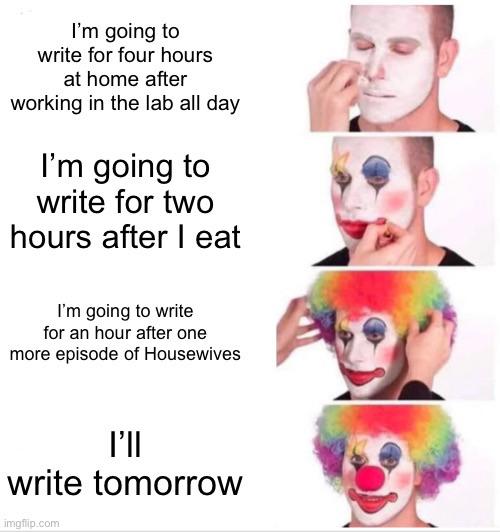this post was submitted on 01 Feb 2024
667 points (98.3% liked)
Science Memes
11004 readers
3000 users here now
Welcome to c/science_memes @ Mander.xyz!
A place for majestic STEMLORD peacocking, as well as memes about the realities of working in a lab.

Rules
- Don't throw mud. Behave like an intellectual and remember the human.
- Keep it rooted (on topic).
- No spam.
- Infographics welcome, get schooled.
This is a science community. We use the Dawkins definition of meme.
Research Committee
Other Mander Communities
Science and Research
Biology and Life Sciences
- [email protected]
- [email protected]
- [email protected]
- [email protected]
- [email protected]
- [email protected]
- [email protected]
- [email protected]
- [email protected]
- [email protected]
- [email protected]
- [email protected]
- [email protected]
- [email protected]
- [email protected]
- [email protected]
- [email protected]
- [email protected]
- [email protected]
- [email protected]
- [email protected]
- [email protected]
- [email protected]
- [email protected]
- !reptiles and [email protected]
Physical Sciences
- [email protected]
- [email protected]
- [email protected]
- [email protected]
- [email protected]
- [email protected]
- [email protected]
- [email protected]
- [email protected]
Humanities and Social Sciences
Practical and Applied Sciences
- !exercise-and [email protected]
- [email protected]
- !self [email protected]
- [email protected]
- [email protected]
- [email protected]
Memes
Miscellaneous
founded 2 years ago
MODERATORS
you are viewing a single comment's thread
view the rest of the comments
view the rest of the comments

It really depends on who you're working for an what industry you're in.
I'm in geoscience. When I was in near surface geophysics consulting, the industry version looks like: you're deployed in the morning to do data collection (leave your hotel). Spend the day in the bush (not really a procrastination opportunity when you're walking around with a magnetometer -- you just walk). Then you get back, dump the data to your laptop and go get dinner. In the evening, you plot the data up as a QA pass, just to make sure there are no gaps or whatever. (Some procrastinating opportunities here, but they're small.) Next day you repeat until you've covered your survey area.
Maximum 21 days in a row. You bank OT hours at 1.5x, so your 12 hour days is 8 hours salary, plus 4x1.5=6 hours banked. Weekend was 12x1.5=16 hours banked. 12x7 hours worked in a week (84 hours) means 66 hours banked.
When you get back to town, you make a report. Usually you've got a budget of about 8-16 hours to turn around the report, but they're so similar to each other than it's almost assembly line. It's not like writing a paper where it's original work. The equations exist, you just have to make the maps, and interpret them. So a day or two in the office. After that, you have 66 hours banked, so you take a week and a half off and still make your salary.
Lather rinse repeat.
I've worked in government geoscience offices and that same report that takes industry two days would take a government geologist a month. In grad school, you could get a whole M.Sc. off of that single site, stretching it out over a year or two! But you'd be expected to reinvent the wheel on all the processing and interpretation because it needs to be "novel" somehow.
In my first year after leaving grad school, I spent 7 months in the field. It was absolutely amazing. I got to travel everywhere, collect, process and report on dozens of unique targets using unique instruments. It was so much better than aimless procrastination.
But I do miss the academic community for the discussions that occurred at pubs, general inquisitiveness of people, and I loved seminars and talks and just being a knowledge sponge.
I do that too. But I started my own business now, later in my career, and crunch time is of my own choosing. And weirdly, I'm most effective as a coder when binge coding -- probably something about the context switching penalties.